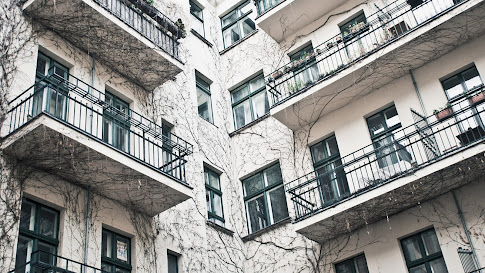RENTING IN GERMANY – A DETAILED 2022 GUIDE

One of the most important jobs when relocating to Germany is finding a place to reside. Only a small percentage of expats choose to buy a home or apartment in Germany after having lived there for a while; the majority prefer to rent. There are a few things that foreigners renting apartments in Germany should be aware of to avoid unnecessary stress and bureaucratic red tape.
This article will describe all the drawbacks and peculiarities of German apartments and offer helpful advice on how to find an apartment in Germany and what to look for in the rental agreement.
8 points to remember when renting a property in Germany
You should be aware of what to expect from German flats before you start your apartment hunt there. They differ from what you are used to in your nation of origin.
In Germany, the great majority of available apartments are unfurnished. Let's discuss what this involves.
1. In German apartments, the bathroom is included.
Every rental unit in Germany comes with a bathroom (s). The shower is frequently built into the bathtub rather than existing as a separate unit. The unit is smaller the more likely this is.
2. Apartments in Germany do not include a kitchen.
For the majority of expats, this is by far the most unexpected component, and it causes a lot of disbelief. The vast majority of unfurnished rental apartments in Germany lack a kitchen. Yes, you did read that right.
What are your choices is the crucial query, then.
Make sure the kitchen is mentioned in your rental agreement if you find a listing that has one in the apartment's pictures. If not, the previous tenant—who might also be the kitchen's owner—will probably take it with them. You can choose from the following options for the kitchen:
Buy the kitchen from the previous occupant.
Only consider apartments with kitchens.
Rent a fully furnished apartment.
Rent a place without a kitchen before getting one.
3. Appliances are not usually included in German apartments.
The same is true for devices like washers and dryers. They are probably not mentioned. Make careful to double-check the measurements if you need to buy one because washing machines in Germany come in a variety of shapes and sizes to fit in teeny apartments. However, due to their large size and high energy consumption, dryers are not commonly used in Germany. Germans use clothes racks to dry their clothes.
4. In Germany, utilities are calculated separately from rent.
The phrases for the cost of a flat are warmmiete (warm rent) and coldmiete (cool rent) (cold rent). The rent is frequently the first amount you see for an apartment. The utilities (Nebenkosten) for water, heating, waste pickup, and occasionally TV cable, among other things, must be included in the rental rate, so this is not the total amount you will pay. Therefore, your total monthly rent payment consists of both the cold rent and the utilities. Typically, utilities do not include electricity, so you will need to sign up with a provider.
5. When looking for an apartment in Germany, communication partners vary.
There is no single individual to get in touch with when looking for an apartment to rent. The landlord (Vermieter), the former tenant (Vormieter), the property management (Hausverwaltung), a real estate agent (Makler), a tenant (Mieter) looking for a sublet (Untervermieter), or a flatmate may be in charge of the listing. To determine who you are dealing with, carefully read the listing.
6. In Germany, deposits are very common.
You will almost certainly be asked to pay a deposit before you can move into your new home (Kaution). The law permits deposits up to three times the net cold rent. The landlord will keep the deposit in escrow while you are a guest there. After moving out, you will get your deposit back in three to six months. The deposit is typically repaid a few days or weeks after you vacate, and the trustworthiness is typically good.
The landlord may, however, keep a portion of your deposit if you have damaged the apartment or have not fully renovated it to restore it to the condition it was in when you first moved in. So, take care of your flat and report any damages promptly so that they can be repaired.
7. In Germany, apartment floor numbers are counted differently.
Don't be perplexed by the floor numbering in German apartment listings. Floors are known by the following names in Germany:
Basement
Ground floor
The first floor above the ground floor
top floor – literally under the roof
8. In Germany, the number of rooms in an apartment is defined.
In Germany, the kitchen and bathroom of a flat are never counted as rooms. That being said, if you want a living room and a bedroom, you should consider a 2-room apartment (2 Zimmer Wohnung) in Germany.
Documents Needed For Renting In Germany
The specific documentation you will need to furnish will be specified in the rental property ad. The following are the seven most typical documents required when renting an apartment in Germany.
1. Copy or scan of passport or ID (Necessity)
2. Proof of income (Necessity)
3. A SCHUFA report(Requested most of the time)
4. An application form or letter (Sometimes requested)
Some advertisements require you to fill out an application form or create an actual application letter to better compare the interested parties. Even if an application letter is not needed, it might help you stand out from the crowd.
7. Private Liability insurance (Beneficial)
Some landlords require that you obtain third-party liability insurance. Even if your landlord does not require it, we recommend including it in your application because it indicates that you are protected and makes you appear more reputable.
Read More : GRUNDSTEUERREFORM / PROPERTY TAX 2022: THIS IS WHAT YOU NEED TO DO NOW


Comments
Post a Comment